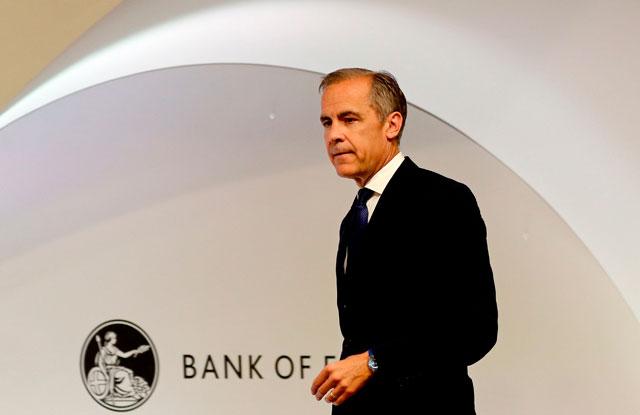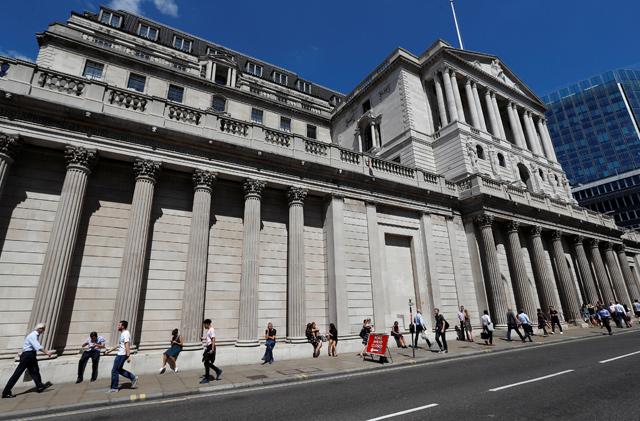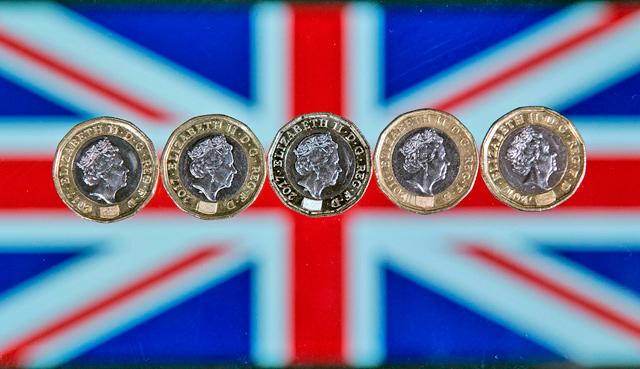You are here
London hikes currency reserves amid Brexit risk
By Agencies - Feb 08,2016 - Last updated at Feb 08,2016
LONDON — London has ramped up its foreign exchange reserves in a move described by British media on Monday as a war chest against market chaos should Britain leave the European Union (EU).
Currency reserves jumped 34 per cent to $98.2 billion (87.9 billion euros) in January 2016, from $73.4 billion for the same month a year earlier, according to recent data from the Bank of England (BoE) which manages the Treasury's foreign exchange funds.
The nation's emergency "war chest" has been ramped up to guard against a "disorderly collapse" in the pound and equity markets if Britons vote in a key referendum expected later this year to leave the EU, The Times newspaper said on Monday.
The reserves are mostly held in dollars.
However, both the BoE and the government declined to comment on why the currency reserves have risen so rapidly over the past year.
"We do not entirely know what the government intentions are," said Scott Corfe, economist at the Centre for Economics and Business Research.
"But that certainly can be one explanation, accumulating currency reserves as a precaution, because there would be some volatility in the event of Brexit," Corfe added.
Economists warn that the pound could potentially collapse by 20 per cent in value, in the event of a British exit.
"Faced with a Brexit, we would expect the authorities to welcome a weaker pound," said David Owen, chief European economist at Jefferies.
A weaker British currency would likely boost the nation's exporters because it makes their goods cheaper for international buyers using stronger currencies.
"The key thing here is see a managed depreciation of sterling — with the [Treasury] still able to successfully issue gilts, rather than something more of a rout," Owen warned.
Support for Britain leaving the EU has risen since Prime Minister David Cameron unveiled plans for a deal to keep the country in the bloc, a poll showed Friday.
The survey showed 45 per cent now wanted to leave the EU, ahead of 36 per cent who wanted Britain to remain in the 28-member club.
That marked a three-point rise for those in favour of a so-called "Brexit" since a poll taken a week earlier.
Cameron has set a deadline of the end of 2017 to hold a referendum on whether Britain should stay in the EU, but sources say he is keen to push a vote through by June.
To get ready for a British exit from the EU and, with little idea of what that would look like, companies are spending millions of dollars and preparing for higher costs and moving their headquarters from Britain.
British business is keen to play down the possibility of a "Brexit" after a planned referendum to ease widespread uncertainty, mainly over how long it would take and how it would play out.
But with the government giving few hints as to how a possible departure could unfold, companies have begun to direct teams of lawyers and advisers to pore over different scenarios to try to determine where they could hurt the most.
Dominic Barton, global managing director at consulting firm McKinsey & Co., said he knew of one global bank which was spending $75 million "because you've got to think about [your] real estate footprint, moving people, tax implications".
"And even though you don't think it's going to happen, as a leader you've got to have a backup plan," he told Reuters.
The chief executive of a large financial institution with business across Europe, who spoke on condition of anonymity, said it could cost $50 million to work out how to shift certain operations from London to cities on the continent.
Companies could consider moving their headquarters due to the uncertainty that would immediately follow an exit vote over Britain's relationship with its former EU partners and the rest of the world.
The costs, he indicated, would include deciding how to take on office space, how to staff new outposts and how to best to manage the large expense of relocating executives and their families to different countries.
Complaints
Cameron has called on businesses to support him in his negotiation with the EU on winning better membership terms for Britain in the bloc and then to campaign alongside him to keep the country in it.
He received a sympathetic response from hundreds of business leaders, but they also called on him to do as much as possible to agree a deal in February and then hold the referendum as quickly as possible — in June.
"Timing is critical," Martin Sorrell, head of the world's biggest advertising group WPP, told Britain's finance minister, George Osborne.
Others wanted more direction from the government, which has refused to talk about a possible exit before Cameron's renegotiation ends, to judge where its departments see the main pressure points if Britain votes to leave.
One investment fund head said it was almost impossible to plan for because there were just too many "unknowns".
Several big international banks think Brexit would be bad for Britain, while they could live with it.
Anne Richards, chief investment officer at Aberdeen asset management, said there would be some winners.
"We are checking to make sure that our existing arrangements could cope, and so far we think they could, so we think we are covered," she said Reuters' Global Markets Forum.
"We don't yet have a handle on costs, but I'm sure the one definite winner out of the referendum, whichever way it goes, will be lawyers and advisory firms we'd all have to hire to make sure we have every base covered," Richards added.
Separately, BoE cut its growth forecasts and the only policymaker who had been pushing for a rate hike reversed his position, suggesting rates will stay on hold for the foreseeable future.
BoE Governor Mark Carney said officials still expected the next move in interest rates to be upwards, but echoed downbeat comments from central banks around the globe, warning that global growth would be modest as emerging economies struggled.
Highlighting risks from China's economic rebalancing and the financial market turmoil, he added that risks to Britain were rising even if domestic demand remained strong.
"All of these developments pose downside risks to growth in the United Kingdom via trade, financial and confidence channels," Carney told a news conference. "The outlook for trade is particularly challenging."
The bank said its Monetary Policy Committee (MPC) voted 9-0 to keep rates on hold at a record-low 0.5 per cent, where they have been for almost seven years.
MPC member Ian McCafferty, who had voted for a rate rise since August, unexpectedly fell into line last week, citing a temporarily weaker outlook for wages.
Central banks around the globe have pared back growth and inflation expectations, openly discussing the need for more accommodation and erasing hopes that policy normalisation could start later this year.
The Bank of Japan last month cut rates into negative territory, the European Central Bank (ECB) hinted at a further cut in March and dovish comments from New York Federal Reserve (Fed) Governor William Dudley suggested that no US rate hike could come at all this year.
Britain has stood out from Europe's economic weakness with relatively healthy growth, little spare capacity and a jobless rate near the long-term equilibrium, for a while raising expectations that it would soon follow the Fed's December hike.
‘Next move is up’
Global market turmoil has since dashed those prospects but Carney noted that the next move was still more likely up than down. Moreover he said that if the BoE followed recent market bets for a rate hike only late next year, it would end up slightly overshooting its 2 per cent inflation target.
"We'll do the right thing at the right time on rates," he added. "More likely than not, the next move is up."
Asked if he stood by repeated remarks that the next rate move is likely to be up rather than down, he stressed: "Absolutely. The whole MPC stands by that."
Since the BoE finalised its forecasts a few days ago, markets have pushed out bets on a first rate rise until mid-2018. There was little change in pricing after Carney spoke.
Economists, however, still mostly expect a much earlier move and RBC's Sam Hill said Carney's comments strengthened his conviction that rates would start to rise in around a year.
"In the near-term, the MPC is more circumspect on the current vote but... a hike is being signalled as necessary some time before markets currently imply," he said.
Part of the reason markets appeared only to expect rates to rise in 2018 was because they were partly factoring in the risk of a rate cut before then, something Hill noted that Carney had dismissed.
Sluggish wage growth
The BoE forecast Britain's economy would grow 2.2 per cent this year and 2.3 per cent in 2017, down from forecasts of 2.5 per cent and 2.6 per cent in November and barely changed from 2015, when growth disappointed expectations.
Consumer price inflation is forecast to stay below 1 per cent through 2016, longer than previously thought, but then is forecast to rise to just over 2 per cent in two years' time, similar to the last set of forecasts.
The BoE also cut its wage forecasts, predicting wage growth of 3 per cent, a level officials had previously identified as supporting a rate rise, only at the end of 2016.
Few weeks ago, Carney said he would only back a rate rise once growth was faster than average, wages had picked up and underlying inflation was nearer 2 per cent.
Carney added that sterling's recent fall, the resilience of the financial system and solid growth in both household and corporate consumption supported the British economy, indicating the domestic economy could withstand increased global stress.
Sterling has weakened by more than 3 per cent over the past three months. The BoE said this reflected concerns about global growth, lower interest rate expectations and possibly uncertainty about Britain's referendum on leaving the EU.
Related Articles
LONDON — The Bank of England (BoE) on Thursday left its key interest rate at 0.50 per cent as it slashed the growth forecast for the B
LONDON — The Bank of England (BoE) appears set on Thursday to hike interest rates to combat high inflation, as it eyes fallout from both Bre
LONDON — Sterling surged on Monday as Britain and the European Union agreed to a 21-month post-Brexit transition period and a potential solu














